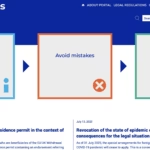
Apartment Rental Agreements in Poland – Key Information for Students Before October
For many students, the arrival of October means not only the start of the academic year but also the search for a new place to live. For those arriving from abroad, finding an apartment is often a particular challenge – not only because of the distance or cultural differences but also due to the language barrier and unfamiliarity with local legal regulations. However, choosing the right accommodation is only the first step. A key element securing the interests of both parties is a well-constructed rental agreement that protects both the landlord and the tenant. This article discusses the most important legal aspects of renting an apartment in Poland and practical tips on what to focus on before signing the documents, thus preparing you for a safe and legal rental, starting your academic year in Poland without unnecessary worries.
Legal Basis
Polish law governing the rental of residential premises is primarily regulated by the Civil Code. Its provisions form the legal basis for the relationship between the tenant and the landlord, defining the obligations and rights of both parties. They address the most crucial issues, such as the duration of the agreement, conditions for its termination, and the rules for settling payments. They also constitute mandatory provisions – what does this mean for you? Even if your agreement omits an important detail or contains clauses that conflict with it, in the event of a dispute, the provisions of the Civil Code will be the ultimate point of reference. Knowledge of these basics is your most effective legal shield. Thanks to it, you will start the academic year without worries about your housing situation.
Rental Period and Termination
In Polish civil law, there are two main types of rental agreements, distinguished primarily by how their duration is defined.
A fixed-term agreement is defined by a clearly specified end date, which may be set as a particular date or as the lapse of a certain period. This type of contract provides predictability and legal certainty for both parties, but it limits the possibility of early termination.
An indefinite-term (open-ended) agreement, by contrast, does not have a set end date and may be terminated by notice. The tenant may terminate the agreement without providing a reason, while the landlord must demonstrate specific statutory grounds to justify termination. This option provides greater flexibility but less certainty regarding the rental period.
If the agreement does not specify its duration, either party may terminate it, subject first to any notice periods agreed upon in the contract and, if none are provided, to the statutory deadlines. These are as follows:
- For rent payable at intervals longer than one month – three months’ notice, effective at the end of a calendar quarter;
- For monthly rent – one month’s notice, effective at the end of a calendar month;
- For rent payable more frequently than monthly – three days’ notice;
For daily rent – one day’s notice.
If the rental period is specified, termination by either party is possible only in cases expressly provided for in the agreement.
Key Elements of the Agreement
A good rental agreement should clearly and precisely regulate the following issues:
- Parties’ details – full names, addresses, and PESEL or NIP numbers of both landlord and tenant.
- Description of the property – exact address, square footage, number of rooms, technical condition, and inventory.
- Rental period – start and end date of the agreement, conditions for its extension or termination.
- Financial conditions – amount of rent, payment deadlines, method of calculating additional charges such as utilities or heating, and rules for the return of the deposit.
- Usage rules – regulations concerning pets, subletting, renovations, and liability for any damages.
- Termination of the agreement – termination procedures, including notice periods and the manner in which notice must be given.
It is important that all provisions are formulated clearly and accepted by both parties. It is also recommended to prepare a handover protocol that documents the condition of the premises on the day of transfer.
Agreement for Foreigners
Submitting proof of secured accommodation is one of the key conditions you will have to meet as part of the procedure for applying for a residence permit in Poland. Therefore, the agreement must meet all the requirements specified in this article so that it will be duly accepted by the competent Voivodeship Office. Documents must be submitted in the original or as a copy certified for conformity with the original by a notary, attorney, legal advisor, or an authorized office employee. Interrelated documents should be submitted together. It should also be remembered that all submitted documents must remain valid on the date the decision is issued.
When concluding a rental agreement with foreigners, remember that the legal basis is Polish civil law, and the agreement itself must contain the same fundamental elements as an agreement with a Polish citizen. Above all, never rely on an oral agreement. Only a detailed, written document provides legal protection for your interests and is the basis for enforcing any arrangements in case of a dispute. This is an absolute fundamental.
To avoid misunderstandings, insist on bilingualism: The ideal solution is to prepare the agreement in two language versions – in Polish and in a language you understand. This is the best guarantee that both parties have the same expectations. If this is impossible, consider investing in a translation of the agreement by a sworn translator before signing it. It is a cost that can save you from much higher costs in the future. Some landlords may ask you to attach a written statement to the agreement in which you confirm that you understand and accept all its terms. Do not sign it if you are unsure about anything.
It is crucial to verify the landlord’s identity and their right to the apartment. Before signing the agreement, ask them to show a document, such as a notarial deed or an extract from the land register, which confirms that they are the owner. Ensure that the personal data in the rental agreement perfectly matches their ID card, and that the property address is correct. An honest landlord will understand this caution. This simple action is the most effective shield against fraud and protects you from losing your deposit or illegal renting.
What to Watch Out For
It is absolutely essential to conclude the rental agreement in written form. An oral agreement not only provides no legal certainty but also makes it impossible to enforce the rental conditions in case of a conflict. Only a detailed, written document constitutes binding proof of the arrangements between the parties and protects the interests of both the landlord and the tenant. Always demand a written agreement – it is the basic safeguard of your rights.
It is extremely important to verify the landlord’s ownership rights – ask to see a document confirming the right to manage the property. Compare the actual condition of the apartment with the description in the advertisement, and treat any discrepancies as a basis for negotiating the rental terms.
In the financial section, analyze the agreement’s clauses regarding rent, deposit, and additional fees in detail. Check which utilities are included in the rent and which are billed separately. Pay attention to the length of the agreement, the notice period, and payment deadlines. Make sure which fees you cover and which the landlord covers. The standard is that the tenant pays for: electricity, gas, internet, waste disposal, water consumption, and heating.
Before signing the rental agreement, thoroughly check the technical condition of the premises. Pay particular attention to signs of dampness, mold, wall cracks, and the condition of floors, windows, and installations. Ensure that all appliances listed in the advertisement are actually in the apartment and are functional. Note any observed defect in the handover protocol. Finally, ask about the rules regarding pets and smoking, and write down all arrangements precisely in the agreement. Taking time to carefully verify everything before signing will save you stress, money, and unpleasant surprises later on.



